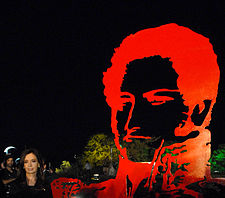- Day of National Sovereignty
-
Day of National Sovereignty 
Image of Juan Manuel de Rosas used during the 2010 celebration of the Day of National Sovereignty.Official name Día de la soberanía nacional Observed by Argentina Significance The day the Argentine Confederation fought against an Anglo-French navy in the Battle of Vuelta de Obligado, during the Anglo-French blockade of the Río de la Plata Date November 20 The Day of National Sovereignty is a national public holiday of Argentina, celebrated during November 20. It commemorates the Battle of Vuelta de Obligado, when a small Argentine army stood against an Anglo-French navy that broke into the Paraná River, against the will of the Argentine Confederation. Although the battle itself ended with an Argentine defeat, the losses of Britain and France in the whole military campaign were so high that they both surrendered to Juan Manuel de Rosas. It was enacted as a national observance in 1974, following a request from the revisionist historian José María Rosa, and promoted into a national holiday in 2010.
Contents
History
José María Rosa was the first one to make reference to November 20 as the Argentine Day of National Sovereignty. It was in 1950, during the second administration of Juan Domingo Perón.[1] The Peronist government did not endorse openly the historical revisionism of the history of Argentina (which sought to modify the mainstream perspectives over Juan Manuel de Rosas), but it allowed public manifestations of it. Perón himself admired Rosas and the battle of Vuelta de Obligado since his time in the military school,[2] but did not engage in the historiographical controversy during his presidency: he mantained that "I have enough problems with living people, to fight with dead people as well".[3] The Rosist revisionism was forbidden during the peronist proscription of the Revolución Libertadora.[1] The first official mention to the date was done by the governor of Buenos Aires province Carlos Aloé in 1953.
In 1954 José María Rosa and Ernesto Palacio created the "Popular organization for the repatriation of the remains of General Rosas". Rosas died in 1877 in Southampton, and his body hadn't been returned to Argentina yet.[4] There was a project of law 20769 to both repatriate the body of Rosas and create a Day of National Sovereignty, proposed by Senator Cornejo Linares. The proposal was approved on November 14, 1973 by the Senate. It was approved with amendments by the Chamber of Deputees, returning to the senate. The new version did not include anymore the new observance but just the repatriation. As a result, deputee Gallo made a new project, the law 20.770, specifically for the new observance. Both laws were approved during the September 25 and 26, 1974. The law 20.770 was promulgated by the executive power the following October 3.
In 2010, year of the Argentina Bicentennial, president Cristina Fernández de Kirchner, who openly supports the Argentine historical revisionism,[5] made a new proposal to increase the number of holidays in Argentina. One of the proposals was to turn the Day of National Sovereignty into a national holiday, instead of just an observance. The proposal was later promulgated by a Necessity and Urgency Decree on November 3.
First celebration
The new holiday was first celebrated in 2010 at Obligado, the site of the battle, in an act with the presence of the president, revisionist historian Pacho O'Donnell and other politicians. The celebration included the inauguration of a monument of the event, created by Rogelio Polesello.[6]
The Radical Civic Union (UCR) was Rosist at its early times, and praised the ideas of the old federalists. The colours of the shield, red and white, reflect that affiliation: federalists weared red badges, and white is the colour of the White Party from Uruguay (the modern National Party), of Rosas' ally Manuel Oribe. The UCR distanced from those ideas in later years, embracing the anti-rosist historiography instead. For this reason, some people was surprised with the presence of Leopoldo Moreau, one of the leaders of the UCR, among the invited guests.[7]
The new holiday did not generate any political controversy.[8]
References
Bibliography
- Galasso, Norberto (2006). Perón: Formación, ascenso y caída (1893-1955). Buenos Aires: Colihue. ISBN 950-581-399-6.
- Hernández, Pablo José (2011). Cristina, los setenta y la Vuelta de Obligado. Buenos Aires: Ediciones Fabro. ISBN 978-987-1677-28-3.
Categories:- Juan Manuel de Rosas
- Holidays in Argentina
- Remembrance days
- Sovereignty
Wikimedia Foundation. 2010.
